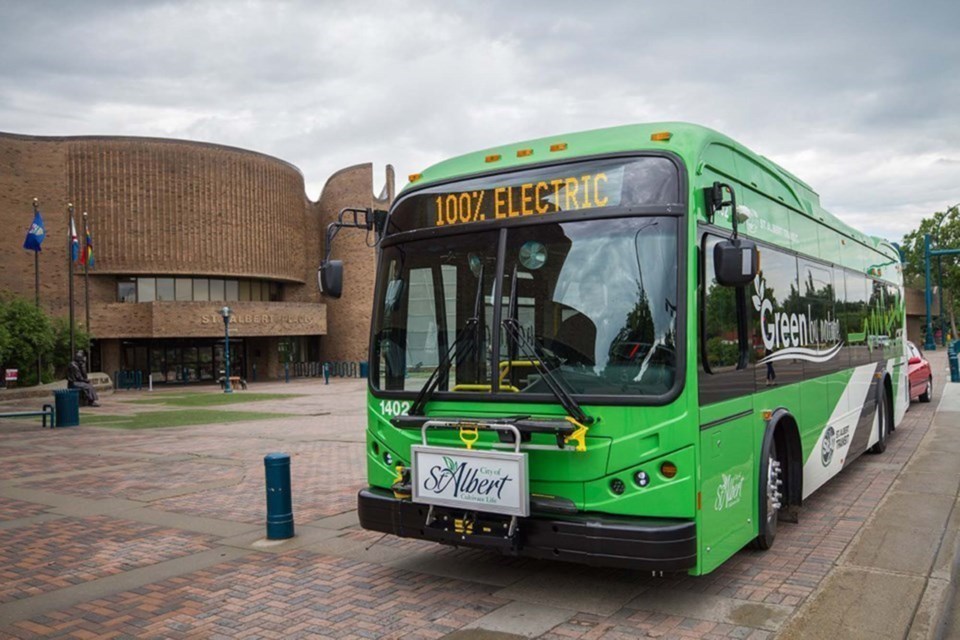St. Albert will need to pay nearly $1.5 million more than expected to purchase 10 new transit buses, city council heard on May 7.
The new buses are part of a multi-year spending plan council signed-off on last August. The plan is to purchase 19 new transit buses between 2024 and 2026, with the first two buses initially expected this year in order to introduce public transit services in the Jensen Lakes and Riverside neighbourhoods.
In August, council heard that $1.62 million would be spent on the two buses needed for Jensen Lakes and Riverside, while $9.25 million would be spent in 2025 to purchase eight of the remaining 17 buses, all of which are going to replace existing buses that are nearing the end of serviceability.
A new report to council, written by the city's director of public operations Tim Saunders, says the cost estimates council approved last summer are about 15 per cent lower than the cost the city is facing to actually buy the buses today.
“The pricing received through the procurement process is higher than the values estimated and brought forward in the charters that were approved for funding,” Saunders wrote. “The prices received are approximately 15 per cent higher depending on the bus configuration and is due to market conditions such as supply chain disruption, extended procurement timelines, and rapid unexpected commodity pricing inflation.”
Coun. Wes Brodhead, who represents St. Albert on the board of directors of the Canadian Urban Transit Association, said ever increasing bus prices is something that municipalities and transit agencies across the country are dealing with.
“Everybody's wrestling with the general increase in cost of rolling stock and it's going to be a reality across the nation,” Brodhead said, adding that it's a good thing “clean diesel” buses are still on the market given how much more expensive electric buses are.
“It's a good thing we can still get clean diesel [but] I'm not sure how long we'll be able to continue to do that,” he said. “If we go to full electric or hydrogen, whichever zero emission vehicle [push] goes, they're going to be more expensive, and we'll just have to deal with it when the time comes.”
“We're only buying a couple at a time, imagine what the impact is if you're buying a fleet of say 40 at a time or 60 or 100 something like that; it's all a matter of scale, so it's difficult for St. Albert to absorb the increased cost but it's proportionate to the size of our system.”
Council unanimously approved city staff's request to increase the plan's 2024 budget by $213,500 to buy the two growth buses, and to increase the 2025 budget by $1.27 million on May 7.
The additional $213,500 needed this year will come from the city's capital reserve, while the additional $1.27 million needed in 2025 will be covered through lifecycle reserves, Saunders wrote, adding that city staff will look for grant funding opportunities in the meantime to try and offset the cost increase.
The first two buses will both be 40-foot diesel buses, as will three of the eight replacement buses the city plans to buy in 2025, along with five 60-foot diesel buses.
In an email, Saunders said that although it was city staff's hope that the two buses needed for Jensen Lakes and Riverside would arrive this year, “the long lead time required to manufacture the buses and have them delivered” means that they won't arrive until early next year.
“By utilizing the existing fleet until the two new buses arrive in 2025, service will still be able to commence in these neighbourhoods in fall 2024,” Saunders said.
Back in August council heard that the plan's 2026 budget to purchase the nine outstanding replacement buses would be about $8.27 million, although that price point was not set in stone and won't be until 2025.
“In consideration of pricing volatility, and to balance risk allocation of cost inflations, firm pricing was requested for budget years 2024 and 2025 only,” Saunders wrote in the new report.
“This was intended to prevent inflated risk pricing for the 2026 buses.”
During the council meeting on May 7, in response to a question from Coun. Shelley Biermanski, Saunders told council that the reason administration isn't buying more buses in 2025 when the cost per bus is certain is simply because existing buses haven't reached the end of serviceability yet, and won't until 2026.
“We don't have much choice,” Biermanski said about dealing with the cost increase for the buses planned to be bought this year and next.
“We need buses.”




